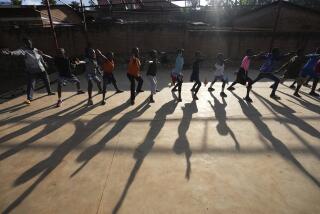Rwanda’s Few Creature Comforts : Africa: With people gone and chaos reigning elsewhere, baboons have moved in and are living it up at a safari lodge.
- Share via
AKAGERA NATIONAL PARK, Rwanda — In a country torn apart by civil war, not every story is of agony. So, while Rwanda struggles to rebuild and coax its people back to their homes, it can be noted that the baboons are moving in and living it up.
Here, on a hilltop with a 100-mile view of the Central African wilderness, is a two-star safari lodge known as Akagera Hotel.
Until this spring’s war, it was a tourist destination for wildlife fanciers. Today, with tourists gone, the wildlife has moved into the Akagera Hotel.
They dwell here as if it’s their own. Particularly a troop of red-bottom, gray-caped baboons--led by a large male, which could be found Wednesday on a fine African afternoon grabbing a drink from the hotel’s circular swimming pool.
Nearby was an empty bottle of 1986 Bordeaux, a tennis racket, a pair of shower slippers and a pile of towels and linen napkins, along with a few broken windows and other debris worthy of a monthlong fraternity binge.
A female baboon and offspring sauntered down a second-floor breezeway. A dozen others slowly walked the grounds, as if pondering whether the reappearance of human visitors to their luxury domain was a signal of impending eviction.
It was not.
Rwanda has troubles enough struggling to rebound from its bloody war. And not the least of these is that defeated Rwanda militia, suspects in a horrifying spree of mass murder in the spring, are now believed to be hiding out in these dry, tree-dotted hillsides with the baboons, cape buffalo and leopards.
But for now, the baboons are safe.
The new Rwandan army provided an armed escort this day for a drop-in visit.
Even battle-hardened soldiers wrinkled their faces into smiles at the spectacle of monkeys living like kings, lounging on a thatched veranda and under shade trees while the screech and twitter of birds filled the ear and six different types of butterflies fluttered across the lawn. Off in the distance below was Lake Ihema, beyond that Tanzania.
There was nothing like a long-snouted, amply fanged baboon to mock the neatly printed signs: “Access Forbidden for Non-Residents.” And, “Swimming Pool Entry Charge, $5.”
Mind you, room service at the Akagera is not what it was.
And while several baboons provided a diversion on the lawn, others showed the skill required to fend for themselves, sneaking into their visitor’s car to pilfer lunch.
More serious appropriations, by humans, are widespread in this nation in the aftermath of war.
Hutus ruled here most recently and made up the vast majority of the population. But they fled in the face of a victorious army of rival Tutsis. The Tutsi soldiers are themselves mostly sons of refugees. They are young men who grew up in Uganda, Burundi and Tanzania and who came home now, many for the first time, behind the barrel of a gun.
Now, in front of them, more than 2 million Hutus have fled into refugee camps. And old Tutsi expatriates are moving back in from neighboring countries, grabbing farms, businesses and homes.
Today, Kigali is bustling enough to almost recall its smoggy, congested, hurly-burly past. Men and women walk the roads in clean clothes, heads held high, waving. They have found home.
For the man who lived 30 years in neighboring Burundi, this was his first week in his homeland since he was 6. The local army commander now controls ground forbidden to him his entire life.
There is an undeniable joy in their faces.
“You see Rwanda coming back to life,” said British Army Maj. M. J. Wharmby, who is serving on humanitarian duty in Kigali.
More to Read
Sign up for Essential California
The most important California stories and recommendations in your inbox every morning.
You may occasionally receive promotional content from the Los Angeles Times.










